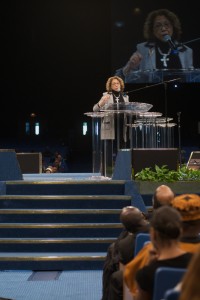Church has long been the heart and soul of the African American community, and when the California State University system was looking at effective ways to increase college-going rates among black students, the church was a natural starting point. And since 2005, CSU president, vice presidents and Chancellor Charlie Reed–along with students and staff from the 23 campuses–have been visiting black churches throughout the state during the month of February for an event that is known as Super Sunday. Between northern and southern California, the CSU will be visiting 102 churches this year.

On Feb. 12, CSU Dominguez Hills President Mildred García will address the congregation of Carson’s Family of Faith Christian Center. Then on Feb. 26, University Outreach Director Gayle Ball-Parker will take to the pulpit at Trinity Baptist Church in Los Angeles. Students and staff will also be on hand after the services to answer whatever questions people may have, all in an effort to educate students, parents, grandparents, and their extended church families about how to get to college.
“When you go to churches you have support of families, you have support of your pastors, and that carries a lot of weight.” Ball-Parker said. “It’s that whole ‘it takes a village.’ We have more churches requesting CSU speakers to come to churches than we have people to go. I just think it was an amazing idea.”
It’s an idea that appears to be working. In the past seven years, undergraduate applications of African American students to the CSU has increased, and from 2009-10 to 2010-11 there was a more than 8 percent increase.
However, Super Sunday is only one component of the CSU’s commitment to getting more African American students to realize college is possible. The African American Initiative is a year-long effort–with the church often at the center–that includes Super Sunday; Train the Trainer workshops that give education advisers in the churches and elsewhere in the community more intensive information about the requirements of college; Super Saturday college fair, which has been held every year on the CSU Dominguez Hills campus; and Summer Algebra Academy, which offers algebra instruction for seventh and eighth grade students at partner churches for six weeks in the summer.
Ball-Parker said the combination of all these efforts goes a long way toward demonstrating to the community that CSU cares, and that when they visit churches during Super Sunday each February it’s not just a photo op.
“I think the fact that they really know that the CSU cares, that they can call us–and they do call us. I’ve had pastors who call me, I’ve had pastors who have come down to financial aid and paid somebody’s fees–really has an impact,” said Ball-Parker.
But the visual of Reed, García and other CSU representatives up at the pulpit is a strong one that makes a statement of the strong relationship between the CSU and the African American community
“They give us about 5 minutes, which is a big deal for an African American pastor to give anybody time in their pulpit. That says to the congregation that what we have to say is important,” Ball-Parker said. “Dr. García does an amazing job. She tells her story, and people can relate to that. She’s a perfect example of how education definitely improved her life.”
Senior Pastor Sherman Gordon of Family of Faith Christian Center agrees.
“Dr. García serves as an excellent role model of success for minorities and young women in particular. I am excited about the continual opportunity to work alongside her,” he said. “For the last four years, this vital partnership has netted in an increased awareness amongst our community’s youth regarding the importance of pursuing and attaining higher education. It is the church’s belief that through the collaborative efforts of parents, clergy, and those involved with higher education, motivating, encouraging, and providing the needed resources for our youth to succeed there exists no limits to how far or how high they can excel.”
As part of Black History Month, Dateline Dominguez is profiling a few of the accomplishments and contributions of African American students, faculty, alumni, and academic departments, as well as special events marking the month on campus. For more Black History Month 2012 coverage, go here.